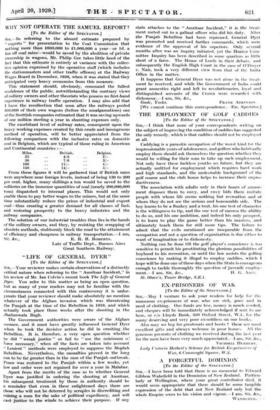WHY NOT OPERATE THE SAMUEL REPORT?
[To the Editor of the Svic-ramon.] • SIR,—In referring to the absurd estimate prepared by " experts " for presentation to the Coal Commission that nothing more than £600,000 to £1,000,000 a year—or id. a ton off coal rates?----would be saved by the abolition of private ownership in wagons, Mr. Philip Gee takes little heed of the fact that this estimate is entirely at variance with the collec- tive opinion expressed by the operative staff (which includes the stationmasters and other traffic officers) at the Railway Wages Board in December, 1926, when it was stated that they anticipated very heavy economies from this measure.
This statement should, obviously, conunand the fullest confidence of the public, notwithstanding the contrary views of colliery owners and other theorists who possess no first-hand experience in railway traffic operation. I may also add that I have the recollection that soon after the railways pooled 300,000 of their own wagons (before the amalgamations) one of the Scottish companies estimated that it was saving upwards of one million sterling a year in shunting expenses only.
The exorbitant level of railway rates, consequent upon the heavy working expenses created by this crude and incongruous method of operation, will be better appreciated from the following comparison with the inclusive rates on domestic coal in Belgium, which are typical of those ruling in American and Continental countries :-
Miles. British. Belgian.
25 4/ 6 2/ - 50 7/6 3/- 100 11/-
4/-
150 14/-
5/- From these figures it will be gathered that if British rates were anywhere near foreign levels, instead of being 150 to 200 per cent. higher, many shillings a ton would be saved to the collieries on the immense quantities of coal (nearly 200,000,000 tons) dispatched to internal places. This would not only enable them to pay better wages to the miners, but at the same time substantially reduce the prices of industrial and export coal—thus creating a greater deniand for all classes of fuel, and restoring prosperity to the heavy industries and the railway companies.
The solution of our industrial troubles thus lies in the hands of the colliery owners, and they, by resisting the scrapping of obsolete methods, stubbornly block the road to the attainment of efficiency and cheapness in railway transportation.—I am, Late of Traffic Dept., Buenos Aires Great Southern Railway.
























































 Previous page
Previous page